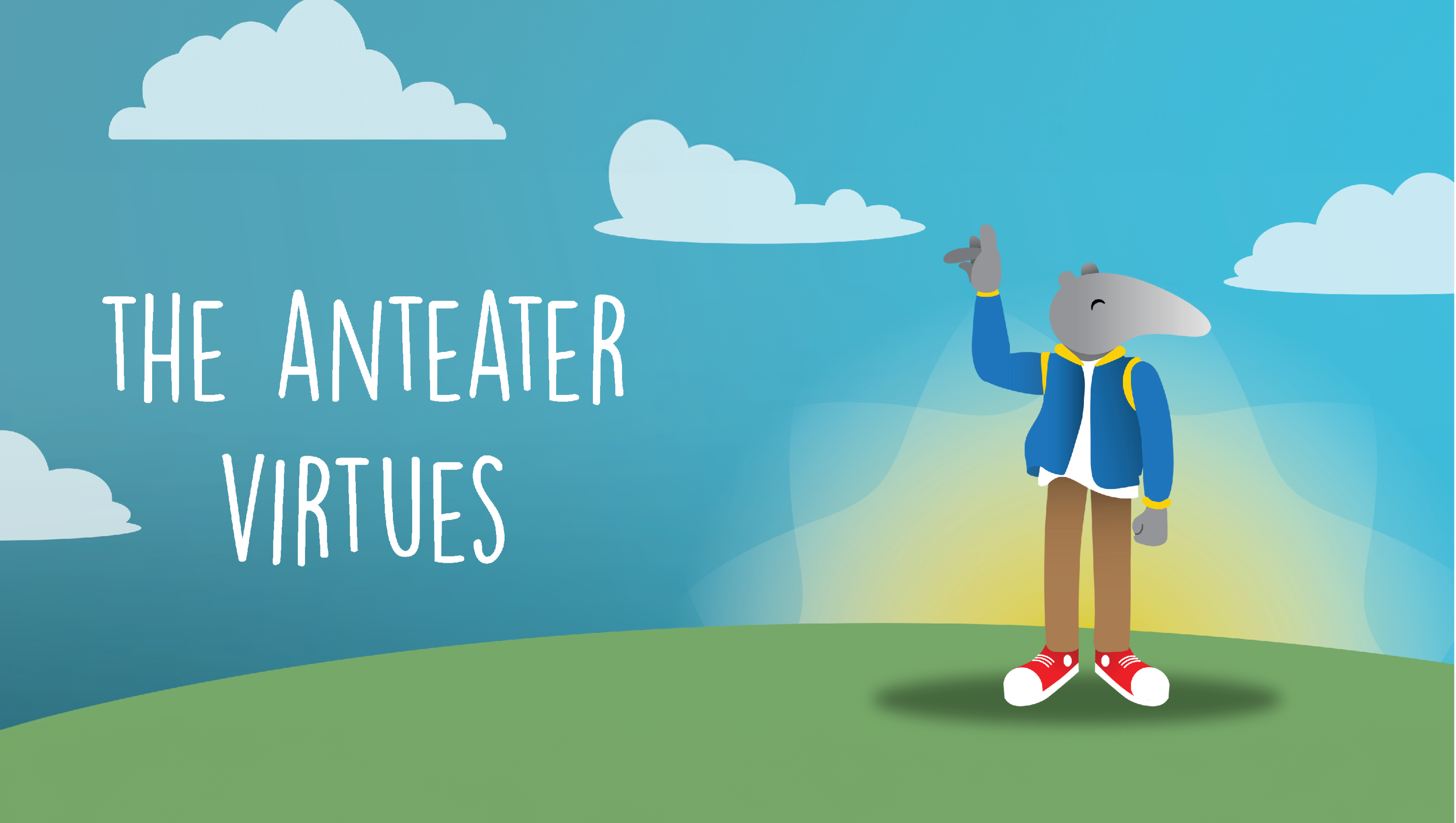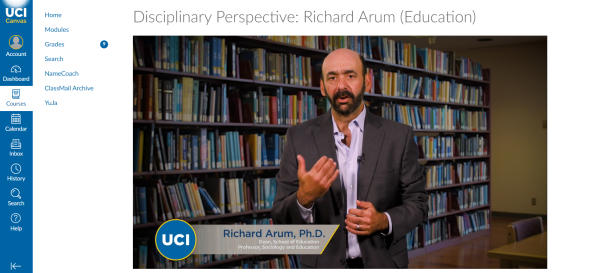
By Nikki Babri and Leanne Ozaki
From the great philosophers of civilizations past to the classrooms of UC Irvine, the Anteater Virtues Project is a first-of-its-kind initiative poised to improve students’ educational experiences and transform conversations about the purpose of higher education.

Created and directed by Distinguished Professor of Philosophy Duncan Pritchard, who specializes in epistemology, the theory of knowledge, the Anteater Virtues Project advocates for a more holistic approach to education.
“We believe that the goal of education should be concerned not only with ensuring that students gain useful facts and cognitive skills but also with their personal growth, where this includes the development of their intellectual character,” Pritchard explains. “Being virtuous is not like riding a bike – you cannot learn it once and then be set for life. Education is a lifelong process, and higher education should be geared towards preparing students for this.”
From Ancient Greece to modern classrooms
Initially piloted in 2019 with support from UCI’s Division of Teaching Excellence and Innovation (DTEI), the Anteater Virtues Project features interdisciplinary, faculty-led modules promoting character growth. It consists of four intellectual character traits that UCI strives to cultivate in students as part of its comprehensive educational mission: curiosity, integrity, intellectual humility and intellectual tenacity.
Inspired by Aristotle’s concept of a virtuous life, the Anteater Virtues Project draws from diverse philosophical traditions including Greek, Egyptian, Confucian and Indian thought. It focuses on intellectual rather than moral virtues, emphasizing the fundamental qualities of good scholarship that are essential across time, cultures and disciplines.
The project breaks new ground as the first initiative of its kind at a leading R1 university, uniquely integrating intellectual character traits into the core of its undergraduate curriculum across campus. As director of the interdisciplinary Center for Knowledge, Technology & Society, Pritchard underscores the project’s dual nature as a pedagogical initiative and a research endeavor. “The project is both grounded in and contributing to research,” he explains. “It’s driven by research in such fields as philosophy, educational theory and the social sciences.”

This research-driven approach is yielding promising results. Pritchard has been collaborating with Richard Arum, professor of education and sociology and former dean of the School of Education, who directs the UCI Measuring Undergraduate Success Trajectories (UCI-MUST) Project. Arum’s research team has been studying the effects of this pedagogical initiative and found that it leads to significant improvements in students’ intellectual curiosity and understanding of virtues. Subsequent studies confirm that incorporating these virtues into curricula leads to greater growth in students’ overall intellectual character.
Interdisciplinary scholarship
The Anteater Virtues Project has been widely embraced across UCI, with all students encountering introductory modules during campus orientation. Thousands of students have engaged with the modules, which cover topics from gullibility to misinformation in the age of AI, and incorporate historical figures like Sherlock Holmes, Marie Curie and Desmond Tutu to illustrate specific virtues.
Hundreds of faculty members have undergone pedagogical training that incorporates the Anteater Virtues as a core component. The DTEI Anteater Virtues webpage also offers suggestions to assist faculty with incorporating the Anteater Virtues in their teaching.
Michael Dennin, Vice Provost for Teaching and Learning and Dean of Undergraduate Education, emphasizes the project’s interdisciplinary nature: “What’s wonderful about the Anteater Virtues is how it brings together faculty from across the university. We’re all speaking a common language about what it means to be a scholar and a lifelong learner.”
Faculty from various schools contribute content, applying the concept of intellectual virtues to their respective disciplines. Students begin with universal modules, gradually progressing to major-specific content as they progress through their degree. This culminates in a capstone project where students explore how intellectual virtues relate to their chosen field of study.
While the Anteater Virtues Project spans disciplines, its basis in the humanities, particularly philosophy, provides an essential foundation. The project’s approach effectively embeds the skills of critical thinking, self-reflection and ethical reasoning – traditionally associated with the humanities yet crucial across all disciplines – into the curriculum.
Transforming science education and prison reform

The project’s innovative approach to education is making waves off campus, influencing wide-ranging educational settings and reaching learners of all ages. Extending its reach beyond UCI, the Anteater Virtues Project is collaborating with the Discovery Cube Museums in Santa Ana and Los Angeles to develop new exhibits. The goal is to provide visitors with a conceptual framework to think about their learning in terms of character development, which mirrors UCI’s approach.
Departing from traditional passive displays, the new Discovery Cube exhibits emphasize active participation and collaborative problem-solving. These installations encourage visitors to reflect on their development of intellectual virtues like creativity and collaboration as they progress through the exhibits. Designed for whole-family engagement, they aim to create an immersive experience that involves parents and children together, fostering character development across generations.
The Anteater Virtues Project further extends to prison education through UCI’s Leveraging Inspiring Futures Through Educational Degrees (LIFTED) program, building on Pritchard’s previous successful work in Scottish prisons. His approach, which drastically improved prisoners’ critical thinking and collaboration skills, has since been incorporated into Scottish prisons across the country.
Now, through LIFTED, UCI’s incarceration education project, the school is bringing similar opportunities to incarcerated students in California. “LIFTED is delighted to be facilitating access for our incarcerated students to more and more of the resources that make the main-campus Anteater experience so inclusive and engaged,” shares Keramet Reiter, director of LIFTED and professor of criminology, law and society. “Extending access to Anteater Virtues for our incarcerated students is a perfect example of this work.”
The project is committed to understanding and maximizing its impact across all its applications. As part of this commitment, the project’s impact on LIFTED students will also be evaluated by Arum’s UCI-MUST research team, just as it evaluates its effect on UCI undergraduates.
Shaping the next generation
On campus, the Anteater Virtues Project engages students at all levels. Undergraduate students like Yifei Zhang ‘24, a recent UCI graduate with degrees in East Asian cultures, philosophy and criminology, law and society, have played crucial roles in shaping the project. Zhang and her peers in the School of Social Ecology participated in workshops, contributed student perspectives and brainstormed solutions to project challenges.

“The skills and mindset I developed through the Anteater Virtues Project are already benefiting me in my current graduate program,” explains Zhang, who is currently pursuing an M.A. in East Asian Languages and Cultures at Columbia University. As she explores new areas of study, she credits the project with enhancing her ability to think critically, connect diverse subjects and maintain an open-minded, intellectually curious approach.
Graduate students are also finding value in the project. Carl Sohmer, a Ph.D. student in philosophy who teaches part-time at a local middle school, has incorporated the Anteater Virtues into his curriculum. Sohmer uses Greek myths to demonstrate intellectual virtues, making abstract concepts tangible for younger learners. His students developed a new vocabulary for self-reflection and interpersonal communication, leading to improved classroom dynamics and personal relationships.

“My students began to acquire a language to express their faults and strengths,” Sohmer recalls. “It was also extremely helpful for parent-teacher conferences, where I used the language of virtues and vices to develop plans for student success. I truly believe it was transformative for my students and for me as an educator.”
Addressing AI
As artificial intelligence reshapes education at all levels, the Anteater Virtues Project gains new relevance. Pritchard views AI as both a challenge and an opportunity, prompting a reevaluation of education’s purpose. “We’re trying to change the whole conversation about higher education,” Pritchard explains. “In an age of AI and rapid technological change, understanding education in terms of intellectual character explains why we still need human-centered learning experiences.”
The project posits that education must transcend the basic acquisition of skills and facts, which AI can increasingly provide. Instead, it should cultivate intellectual virtues that enable students to use AI effectively and ethically, preparing them for lifelong learning in any technological context.
Part of the project’s mission is to transform wider conversations on the purpose of education. To this end, all teaching materials, developed in partnership with DTEI, are publicly and freely available. This includes a Canvas course accessible to non-UCI community members, allowing other institutions and researchers to utilize and build upon the project’s resources.
This perspective is driving new research initiatives. Recently, the team secured two new grants. A $500,000 grant from the John Templeton Foundation will study how educating for virtuous intellectual character affects students’ interactions with AI. A $400,000 award from the Educating Character Initiative at the Program for Leadership and Character at Wake Forest University will be aimed at helping the Anteater Virtues Project reach new audiences beyond UCI, such as other universities, community colleges, high schools and prisons. These awards follow a prior $1 million grant from the John Templeton Foundation in 2022 to expand the project.
UCI’s Year of Scholarly Values
The Anteater Virtues Project is integral to UCI’s recently announced Year of Scholarly Values initiative. This campus-wide endeavor, introduced by Chancellor Howard Gillman, aims to engage the entire UCI community in discussions about the essential role of scholarly values in knowledge discovery and dissemination across diverse disciplines.
The Year of Scholarly Values initiative addresses pressing challenges facing higher education. It brings the fundamental values of higher education back to the forefront, exploring how universities contribute to society in an era of AI and online learning, and tackles issues of free speech and intellectual diversity on campuses.
Pritchard sees a natural alignment between the Anteater Virtues and this broader initiative. “You can’t really talk about or understand scholarly values without thinking about the intellectual virtues,” he explains. “Scholarly values are essentially intellectual values. It’s the life of the mind.”
To learn more or access the Anteater Virtues Project’s materials, visit their website.
Interested in reading more from the School of Humanities? Sign up for our monthly newsletter.
